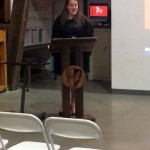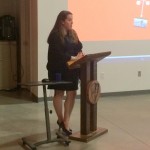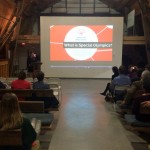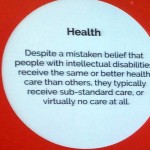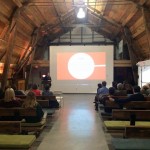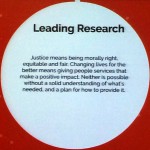We were honored to have Meredith Ciaccia, class of ’08, as our November presenter in Harley’s Commons Speaker Series. As Senior Manager of Government Relations & Program Development for Special Olympics in Washington DC, Meredith spoke about her work in creating policy, advocacy, education, and community health support for individuals with intellectual disabilities. In her position, she interacts with leaders from 169 countries worldwide to secure inclusive education and health services, as well as to create sustainable platforms for healthy athletes using community health care partnerships.
She shared some rather sobering and startling information about the population she works with:
- 1 in every 5 of the world’s poorest people has intellectual disabilities.
- There are up to 200 million people with intellectual disabilities worldwide.
- 90% of children with intellectual disabilities in developing countries are denied education.
- The world unemployment rate hangs around 9%, but for the Special Olympics athletes, it is closer to 21%.
- 68% of the female Special Olympics athletes have been abused before the age of 18.
While these are dire numbers indeed, Special Olympics has been working for 50 years to send the message that people with intellectual disability can and will succeed when given the chance. They are the world’s largest public health organization for people with intellectual disabilities.
In 1997, Special Olympics started the healthy athletes program. This delivers free services in seven medical disciplines to the competing athletes. These range from evaluations to free services and equipment, like hearing aids, glasses, and dentistry. They have trained 136,000 health care professionals to work within this program. Special Olympics also holds the largest data base of health information for athletes with intellectual disabilities.
Meredith described the Healthy Communities program that was rolled out in 2012. With primary funding from the Golisano Foundation, this program focuses on access and education. Currently, they have partnerships with over 200 health organizations and universities to extend health services to the communities in which the Special Olympics athletes live.
In her job, Meredith spends 30% of the year on the road to far-reaching places such as Malawi, Ireland, South Korea, and Austria. She works with these countries (and many more) to help them meet the Sustainable Development Goals. She is especially excited about the Unified Champions for School and Youth Initiatives in the United States. This program delivers $15M in federal funding which is all spent on the athletes and their health and education. Special Olympics makes the initial investment, then schools match the funding and grow it each year until they are self-sustaining. For more information on Unified Champions, please follow the link to their website: http://www.playunified.org/.
